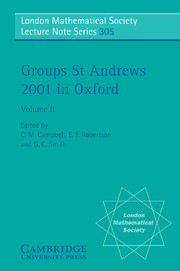Book contents
- Frontmatter
- Contents
- Introduction
- Gracefulness, group sequencings and graph factorizations
- Orbits in finite group actions
- Groups with finitely generated integral homologies
- Invariants of discrete groups, Lie algebras and pro-p groups
- Groups with all non-subnormal subgroups of finite rank
- On some infinite dimensional linear groups
- Groups and semisymmetric graphs
- On the covers of finite groups
- Groupland
- On maximal nilpotent π-subgroups
- Characters of p-groups and Sylow p-subgroups
- On the relation between group theory and loop theory
- Groups and lattices
- Finite generalized tetrahedron groups with a cubic relator
- Character degrees of the Sylow p-subgroups of classical groups
- Character correspondences and perfect isometries
- The characters of finite projective symplectic group PSp(4, q)
- Exponent of finite groups with automorphisms
- Classifying irreducible representations in characteristic zero
- Lie methods in group theory
- Chevalley groups of type G2 as automorphism groups of loops
Exponent of finite groups with automorphisms
Published online by Cambridge University Press: 15 December 2009
- Frontmatter
- Contents
- Introduction
- Gracefulness, group sequencings and graph factorizations
- Orbits in finite group actions
- Groups with finitely generated integral homologies
- Invariants of discrete groups, Lie algebras and pro-p groups
- Groups with all non-subnormal subgroups of finite rank
- On some infinite dimensional linear groups
- Groups and semisymmetric graphs
- On the covers of finite groups
- Groupland
- On maximal nilpotent π-subgroups
- Characters of p-groups and Sylow p-subgroups
- On the relation between group theory and loop theory
- Groups and lattices
- Finite generalized tetrahedron groups with a cubic relator
- Character degrees of the Sylow p-subgroups of classical groups
- Character correspondences and perfect isometries
- The characters of finite projective symplectic group PSp(4, q)
- Exponent of finite groups with automorphisms
- Classifying irreducible representations in characteristic zero
- Lie methods in group theory
- Chevalley groups of type G2 as automorphism groups of loops
Summary
Abstract
Let A be a finite group acting coprimely on a finite group G. It was recently discovered that the exponent of CG(A) may have strong impact over the exponent of G. In this paper we discuss results on the exponent of a group with coprime automorphisms, as well as some applications and open problems. No detailed proofs are given.
Introduction
Let A be a finite group acting coprimely on a finite group G. It is well-known that the structure of the centralizer CG(A) (the fixed-point subgroup) of A has strong influence over the structure of G. To exemplify this we mention the following results.
The celebrated theorem of Thompson [27] says that if A is of prime order and CG(A) = 1, then G is nilpotent. On the other hand, any nilpotent group admitting a fixed-point-free automorphism of prime order q has nilpotency class bounded by some function h(q) depending on q alone. This result is due to Higman [13]. The reader can find in [15] and [16] an account on the modern developments related to Higman's theorem. The next result is a consequence of the classification of finite simple groups [29]: If A is a group of automorphisms of G whose order is coprime to that of G and CG(A) is nilpotent or has odd order, then G is soluble.
- Type
- Chapter
- Information
- Groups St Andrews 2001 in Oxford , pp. 528 - 536Publisher: Cambridge University PressPrint publication year: 2003



